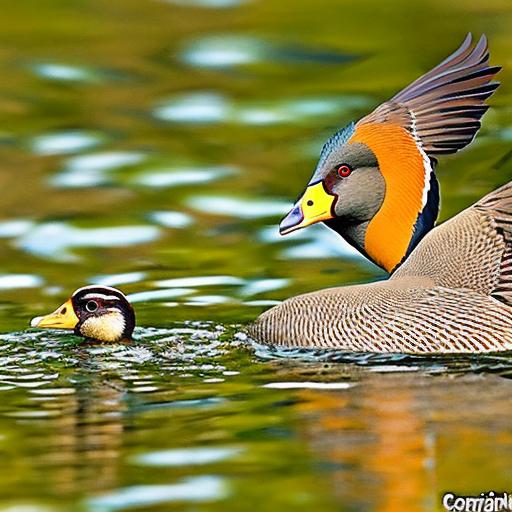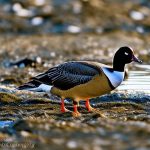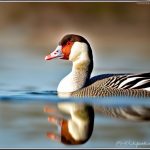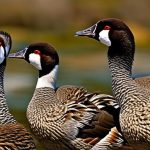Geese invading ponds and causing damage is a common problem faced by many pond owners. These large birds can be a nuisance, leaving behind droppings that can contaminate the water and surrounding areas. Additionally, their constant presence can scare away other wildlife and disrupt the peaceful environment of the pond. Fortunately, there are several methods that can be used to deter geese and prevent them from causing further damage.
Key Takeaways
- Geese are attracted to open water and grassy areas near ponds.
- Physical barriers like fences or netting can prevent geese from accessing the pond.
- Decoys like fake predators or other animals can scare geese away.
- Motion-activated sprinklers can startle geese and make them uncomfortable.
- Sound deterrents like loud noises or predator calls can also deter geese.
Understanding the behavior of geese
To effectively deter geese, it is important to understand their behavior and what attracts them to ponds in the first place. Geese are attracted to ponds because they provide a source of food, water, and shelter. They are herbivores and feed on grass, aquatic plants, and grains. Ponds often have an abundance of these food sources, making them an ideal location for geese to graze.
Geese are also attracted to ponds because they provide a safe nesting habitat. Geese are territorial birds and will defend their nesting sites aggressively. They prefer nesting near water bodies as it provides protection from predators. This territorial behavior can lead to increased aggression towards humans or other animals that come too close to their nesting area.
Creating physical barriers around the pond
One effective method of deterring geese is by creating physical barriers around the pond. There are several types of barriers that can be used, including fences, netting, and floating barriers.
Fences can be installed around the perimeter of the pond to prevent geese from accessing the area. These fences should be at least three feet high and have small openings to prevent geese from squeezing through. However, fences may not be aesthetically pleasing and can obstruct the view of the pond.
Netting can also be used to cover the surface of the pond, preventing geese from landing on the water. This method is effective in deterring geese but may require regular maintenance to ensure the netting remains intact.
Floating barriers are another option and can be placed on the water to create a physical barrier between geese and the pond. These barriers are often made of plastic or metal and can be easily installed and removed as needed. However, they may not be effective in deterring geese if they are determined to access the pond.
Using decoys to deter geese
Decoys can be an effective method of deterring geese from ponds. Decoys are life-like replicas of geese that are placed in or around the pond to scare away real geese. The presence of these decoys can signal to geese that the area is already occupied, discouraging them from landing or nesting.
There are several types of decoys available, including stationary decoys and motion-activated decoys. Stationary decoys are placed in strategic locations around the pond and remain in a fixed position. Motion-activated decoys, on the other hand, are equipped with sensors that detect movement and emit sounds or spray water when geese approach.
Installing motion-activated sprinklers
Motion-activated sprinklers can also be an effective method of deterring geese from ponds. These sprinklers are equipped with motion sensors that detect the presence of geese and activate a burst of water, scaring them away. The sudden spray of water startles the geese and makes them associate the pond with an unpleasant experience, discouraging them from returning.
The benefits of using motion-activated sprinklers include their effectiveness in deterring geese, their ease of installation, and their low maintenance requirements. They can be set up around the perimeter of the pond and adjusted to cover specific areas where geese tend to gather.
Utilizing sound deterrents

Sound deterrents can be an effective method of deterring geese from ponds. These devices emit loud noises or predator calls that scare away geese. There are several types of sound deterrents available, including sonic devices, ultrasonic devices, and predator calls.
Sonic devices emit loud noises that mimic the distress calls of geese or other birds. These noises can startle geese and make them associate the area with danger. Ultrasonic devices, on the other hand, emit high-frequency sounds that are inaudible to humans but can be heard by geese. These sounds are unpleasant to geese and can deter them from approaching the pond.
Predator calls are another type of sound deterrent that can be effective in deterring geese. These calls mimic the sounds of natural predators, such as coyotes or hawks, and can scare geese away. However, it is important to note that sound deterrents may not be effective in all situations and may require regular maintenance to ensure they continue to work properly.
Planting vegetation that geese dislike
Planting vegetation that geese dislike can be an effective method of deterring them from ponds. Geese prefer to feed on grasses and aquatic plants, so planting vegetation that they find unpalatable can discourage them from staying in the area.
There are several types of vegetation that geese dislike, including tall grasses, prickly plants, and plants with strong odors. Tall grasses can make it difficult for geese to access the water and can obstruct their view of potential predators. Prickly plants, such as thorny bushes or cacti, can deter geese from landing or nesting near the pond. Plants with strong odors, such as lavender or mint, can also discourage geese from approaching the area.
It is important to note that planting vegetation alone may not be enough to deter geese completely. Other methods, such as physical barriers or sound deterrents, may need to be used in conjunction with planting vegetation for optimal results.
Removing food sources near the pond
Removing food sources near the pond can be an effective method of deterring geese. Geese are attracted to ponds because they provide an abundance of food, including grass, aquatic plants, and grains. By removing these food sources, geese are less likely to be attracted to the area.
There are several types of food sources that attract geese, including bird feeders, spilled birdseed, and fallen fruits or berries. It is important to regularly clean up any spilled birdseed or fallen fruits to prevent geese from feeding on them. Additionally, bird feeders should be placed away from the pond to minimize the attraction of geese.
Consistently cleaning and maintaining the pond area
Consistently cleaning and maintaining the pond area is important in deterring geese. Geese are attracted to ponds that provide a source of food, water, and shelter. By keeping the pond area clean and free of debris, geese are less likely to be attracted to the area.
Regular maintenance tasks include removing fallen leaves or branches from the water, trimming overgrown vegetation, and cleaning up any litter or debris around the pond. Additionally, it is important to regularly check for any leaks or damage to the pond that may attract geese.
Implementing humane repellents
Humane repellents can be an effective method of deterring geese from ponds. These repellents use natural ingredients or scents that are unpleasant to geese but safe for humans and other wildlife.
There are several types of humane repellents available, including taste repellents and scent repellents. Taste repellents are applied to vegetation around the pond and make it unpalatable for geese to feed on. Scent repellents, on the other hand, emit strong odors that are unpleasant to geese and can deter them from approaching the area.
It is important to note that humane repellents may need to be reapplied regularly to maintain their effectiveness. Additionally, it is important to choose repellents that are safe for the environment and other wildlife.
Seeking professional assistance if necessary
In some cases, it may be necessary to seek professional assistance to effectively deter geese from ponds. Professional wildlife control experts or pest management companies have the knowledge and experience to implement effective deterrent methods and ensure the safety of both humans and wildlife.
These professionals can assess the specific situation and recommend the most appropriate methods for deterring geese. They can also provide ongoing maintenance and monitoring to ensure the effectiveness of the chosen deterrent methods.
In conclusion, there are several methods that can be used to deter geese from invading ponds and causing damage. These methods include creating physical barriers, using decoys, installing motion-activated sprinklers, utilizing sound deterrents, planting vegetation that geese dislike, removing food sources near the pond, consistently cleaning and maintaining the pond area, implementing humane repellents, and seeking professional assistance if necessary. It is important to try different methods until finding one that works best for your specific situation. By effectively deterring geese, pond owners can prevent further damage and maintain a peaceful environment for both humans and wildlife.
If you’re wondering how to keep geese away from your pond, you might find this article on Poultry Wizard quite helpful. They provide valuable insights on the topic, including tips and tricks to deter geese from invading your pond area. Additionally, Poultry Wizard offers a wide range of resources for poultry enthusiasts, such as information on what geese can eat and how to properly feed them. Check out their article on can geese eat chicken feed for more detailed information. Visit Poultry Wizard to explore their extensive collection of articles, including their guide on chicken coops.
FAQs
What are some common problems caused by geese near ponds?
Geese can cause a number of problems near ponds, including water pollution, damage to vegetation, and aggressive behavior towards humans.
What are some natural ways to keep geese away from ponds?
Some natural ways to keep geese away from ponds include planting tall grasses or shrubs around the perimeter, using decoys of natural predators, and installing motion-activated sprinklers.
What are some non-natural ways to keep geese away from ponds?
Non-natural ways to keep geese away from ponds include using chemical repellents, installing physical barriers such as fences or netting, and using loud noises or flashing lights.
Is it legal to harm or kill geese to keep them away from ponds?
In most cases, it is illegal to harm or kill geese without a permit. It is important to check with local wildlife authorities before taking any action.
What should I do if I encounter aggressive geese near my pond?
If you encounter aggressive geese near your pond, it is important to stay calm and avoid approaching them. Slowly back away and give them plenty of space. If necessary, seek help from a professional wildlife control service.
Meet Walter, the feathered-friend fanatic of Florida! Nestled in the sunshine state, Walter struts through life with his feathered companions, clucking his way to happiness. With a coop that’s fancier than a five-star hotel, he’s the Don Juan of the chicken world. When he’s not teaching his hens to do the cha-cha, you’ll find him in a heated debate with his prized rooster, Sir Clucks-a-Lot. Walter’s poultry passion is no yolk; he’s the sunny-side-up guy you never knew you needed in your flock of friends!







